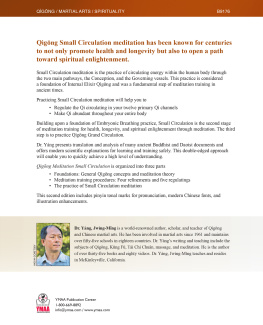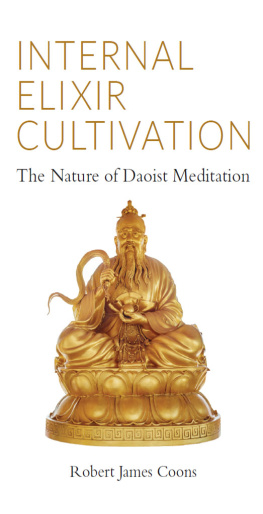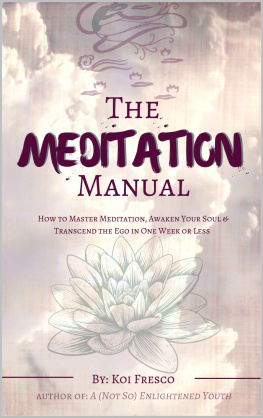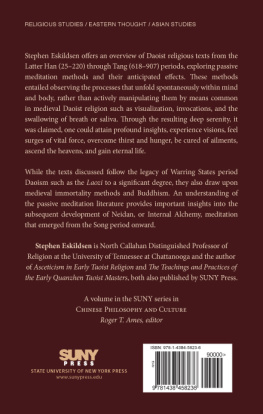INTERNAL
ELIXIR
CULTIVATION
The Nature of Daoist Meditation
INTERNAL
ELIXIR
CULTIVATION
The Nature of Daoist Meditation

Robert James Coons

www.TambuliMedia.com
Spring House, PA USA
DISCLAIMER
The author and publisher of this book are NOT RESPONSIBLE in any manner whatsoever for any injury that may result from practicing the techniques and/or following the instructions given within. Since the physical activities described herein may be too strenuous in nature for some readers to engage in safely, it is essential that a physician be consulted prior to training.
First Published August 01,2015 by Tambuli Media
Copyright @ 2015 by Robert James Coons
ISBN-10:1-943155-13-5
ISBN-13: 978-1-943155-13-2
Library of Congress Control Number: 2015946737
All Rights Reserved. No part of this publication may be reproduced or utilized in any form or by any means, electronic or mechanical, including photocopying, recording, or by any information storage and retrieval system, without prior written permission from the Publisher or Author.
Edited by Herb Borkland
Cover & Interior by Summer Bonne
FOREWORD
Robert Coons in an interesting individual. He is a Canadian who became enamored with Asian culture as a child, and later immersed himself in the traditional ways of China. He has studied areas as diverse as Daoism, internal martial arts, tea culture, poetry, calligraphy, brush painting, and pottery. And he is an expert in Daoist meditation, specifically the methods of cultivating the internal elixir, or life force energy; the topic of this book.
As a fellow traveler on the path of Chinese traditions including martial arts, traditional medicine and qigong practices, I have read several hundred books on the subject including contemporary works and translations of ancient texts. I was hoping to find a book on the topic to publish that would be fresh in its approach and clear in its lessons. I found these attributes in Coons manuscript.
What makes Internal Elixir Cultivation: The Nature of Daoist Meditation special is the authors concise yet detailed approach to the topic. Unlike many works wherein the author seems compelled to shroud the content in enigmatic ideas and esoteric expressions, Coons instead uses direct, clear and simple language to teach the essence of the Daoist meditative method. In short, his work is deep and detailed, drawing on the most treasured ancient texts and teachings, yet at the same time is accessible and practical in its approach.
The works editor, Herb Borkland, expressed the uniqueness of Coons manuscript the best, when he wrote me the following sentences. This is the work of an autodidact, and I bless his dedication and strength of mind and how he has digested and so can make legible so many elusive concepts. To use many words to advertise how to shut up is always the trap in meditation manuals. It seems to me he surmounts that paradox through a very Chinese quality of modest but unshakeable expertise.
And so Tambuli Media is proud to present to you Robert James Coons Internal Elixir Cultivation , for which we are grateful to Robert Cory Del Medico for connecting us with the author. We hope you enjoy and benefit from this book as much as I have.

Dr. Mark Wiley
Publisher, Tambuli Media
TABLE OF CONTENTS

Robert James Coons and his teacher Yang Hai , seated in Master Yangs home in Montreal. Master Yang studied in the Beijing White Cloud Temple with Cao Zhenyang, abbot of the temple and leader of the Dragon Gate sect of Quanzhen Daoism at the time. He also studied in the Sanfeng lineage of Daoism and Tianjin, and with many other teachers who had Daoist teachings either passed down through family, or who had deep personal research into Daoist methods. He specializes in meditation, Chinese medicine, martial arts, qigong, knows various other Daoist arts such as face reading, and holds an MBA.
PREFACE
The West has come to a place of economic prominence in the world, leading to lifestyles which had never been imagined in the ancient world. People are now free to eat and drink whatever they wish they are able to have access to the best health care and have the richest economy in the entire history of mankind. The West is the best it has ever been, and yet people feel a discord.
There is a lack of harmony in the physical and spiritual world of the western psycheand although things are good, people are beginning to see that what they have gained in riches, they have begun to lose in spirit. People have also begun to feel the negative effects of a lavish lifestylewith diseases such as addiction and mental illness at the forefront of society. Almost everyone has been touched by depression, anxiety, obesity, and severe emotional trauma and in the West today, there are very few people who are completely at ease and happy with their own lives.
There is a great move toward new ways of life, but it seems that there are too many roads and not enough maps. There are many promises of salvation, but almost none of them actually yield results.
People see the value in spirituality, but spiritual teachers are often more concerned with lining their own pockets or espousing political and cultural beliefs than with teaching people how to take control of their lives. Worse yet is the pseudo psychology of the pharmaceutical institutions, and the push for doctors to prescribe powerful drugs to people with simple-to-resolve emotional problems or even naturally-occurring states such as sadness. This is perverse and troubling. People are beginning to lose touch with their autonomy and to imagine that they have no control of their own lives.
It can be very difficult to find a good teacher; each practice has its own value. The special quality of Daoism is that the entire practice is laid out in the various meditation and philosophy classics that exist within its canon. With the guidance of a knowledgeable teacher and a good work ethic, students of Daoism may gradually improve their lives by learning to cultivate a feeling of inner awareness and understanding of how to accord with nature in a more harmonious and spontaneous way.
Although this knowledge is available in western religion and philosophy, it has mostly been lost over the racket of buy now, pay as you go style pop spirituality. With the exception of orders such as the Jesuits, Christianity has basically lost its root in contemplative prayer. As such, many western people have begun to feel that the Christian doctrine is something which is taught to them rather than directly experienced. This has created a growth of interest among people in Eastern spiritual traditions such as Buddhism, Hinduism, and Daoism, but because these fields are still relatively new in the west, it is hard for people to contextualize all of the different facets of these practices. This leads to teachers coming forth and if not willingly cheating their students, at least, not being completely prepared for what the western student may face on the spiritual path. People often assume that meditation is a panacea and cure-all, so when they begin learning how to cultivate the practice, they often come to it with unrealistic expectations, and many people are let down and quit early.The meditation industry supports this type of behavior because although it is not beautiful, it is true that even spiritual teachers must put food on their tables, and, as such, many parts of the industry are quite reliant on making big promises in order to pull in new students. It is safe to say that nothing good ever comes to people who dont work for it.
Next page










